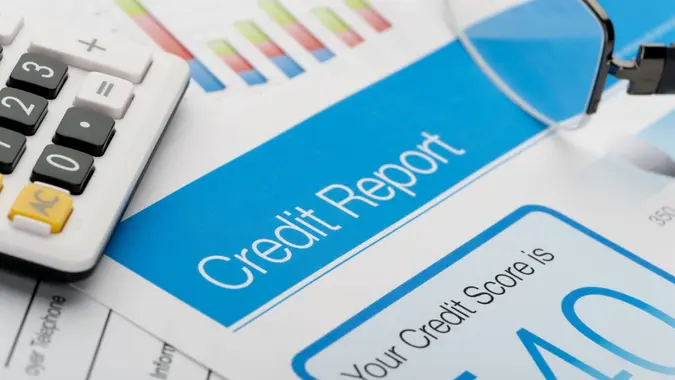Who Can Access Your Credit Score? Here’s the Full List

Commitment to Our Readers
GOBankingRates' editorial team is committed to bringing you unbiased reviews and information. We use data-driven methodologies to evaluate financial products and services - our reviews and ratings are not influenced by advertisers. You can read more about our editorial guidelines and our products and services review methodology.

20 Years
Helping You Live Richer

Reviewed
by Experts

Trusted by
Millions of Readers
By now, you probably know that your credit score helps lenders determine your eligibility and interest rates for loans and credit cards. A good credit score leads to lower interest rates. It can also help you secure an apartment or a new job.
While your credit score is an important piece of your overall financial picture, it is also highly personal information. Not everyone can access your credit score.
There’s a short list of individuals and organizations who can legally access your credit score. In all but a few cases, which are explored below, they need your overt permission. Knowing who can view your credit score can help you protect your financial privacy.
Who Can Legally Access Your Credit Score?
People and organizations who need to assess your financial reliability may be able to check your credit score with or without your permission. But they need a legitimate reason, which the Fair Credit Reporting Act calls “permissible purpose.”
Who has permission to check your credit score?
- Banks and lenders: When you apply for a loan, mortgage or credit card, the lender can check your credit score to determine the amount you can borrow and your interest rate. This type of inquiry is a hard credit check. You must give lenders permission before a hard pull.
- Landlords: When you apply for an apartment, your landlord might do a credit check. Many landlords will perform a soft credit pull, which won’t affect your credit. You can ask if a landlord requires a hard credit pull before you submit your rental application.
- Credit card companies: Those credit card offers you receive in the mail originate from credit card companies doing a soft pull on your credit and realizing you may be a good candidate for their card. They don’t need your permission to perform a soft pull. Likewise, if you check to see if you’re pre-qualified for a credit card, the issuer will also perform a soft inquiry. They may perform a hard pull before finalizing the approval after you apply for a card.
- Insurance companies: Car and home insurance companies may check your credit score to determine your insurance rates in some states.
- Employers: Certain jobs that require background checks may be permitted to view your credit report, but they don’t typically see your credit score. This is a soft inquiry unless you give permission for them to do a hard pull.
- Debt collectors: If they’re trying to collect a debt, lenders and debt collection services can check your credit score and credit report, even without your written permission.
- Utility companies: When you set up a new utility account, such as electric, gas, cable or even cell phone service, the provider may check your credit. This is usually a soft pull.
Can You Check Your Own Credit Score?
You can check your credit score at any time through various services. In fact, you should check regularly, so you know where you stand financially. Checking your own credit score, whether through a free service or one of the credit bureaus, is considered a soft pull and will not lower your credit score.
Here are three easy ways to check your credit score.
Through Your Bank or Credit Card App
Many banks and credit card providers share your credit score for free each time you log in. These services might also alert you to changes in your credit. For instance, you can view your score over time, account alerts and ways to improve your score through Chase’s Credit Journey.
Capital One’s CreditWise service also displays your credit score in the app each time you open it.
Both Chase and Capital One share your VantageScore, which may differ from the score issued by FICO, the service 90% of companies use to measure your creditworthiness, according to Experian.
Free Credit Monitoring Services
You can also use a service like Credit Karma, which isn’t affiliated with a bank, to check your score for free. You’ll need to set up an account and provide personal information, including your Social Security number (SSN).
MyFico and Credit Sesame are similar services. FICO provides your FICO 8 score, which is most frequently used by lenders.
Be wary of services that require a credit card to sign up to view your credit score. You’ll need to remember to cancel before the trial period, or you’ll get charged for a month of service.
Directly Through the Credit Bureaus
All three credit bureaus — Experian, Equifax and TransUnion — allow you to check your credit score online.
TransUnion charges a $29.95 monthly fee for its Credit Monitoring Service and shares your VantageScore.
Experian provides access to your FICO 8 score and your Experian credit report for free.
Equifax has three plans to monitor your credit score and credit reports, ranging in price from $100 for the year up to $300 per year for a family plan.
When Do Lenders and Companies Check Your Credit Score?
Lenders check your credit score, with your permission, if you apply for a credit card, car loan, car lease, mortgage or personal loan. Prospective landlords may check your credit when you apply to rent an apartment. When you write a new car insurance policy in some states, the carrier may check your credit. Finally, utility companies may check your credit when you open a new utility account for electric, gas, cable or cell phone service.
If you’re renewing a loan or contract or extending a car lease, the same organization may check your credit again to re-evaluate your interest rate.
Hard inquiries lower your score slightly. A credit check usually lowers your credit score by five points and can stay on your credit report for two years. The impact of that credit score ding diminishes over time.
If you’re shopping for a new apartment, mortgage or car loan, which require a hard pull, try to keep inquiries of a similar type within a 30-day window. The credit bureaus consider this as a single query to minimize the impact on your credit score.
Can Friends, Family or Strangers Access Your Credit Score?
Anyone without a permissible purpose cannot legally access your credit score. If your credit score is less than stellar, don’t worry that friends, family members or even dating prospects will judge you; they can’t access your score unless you show it to them or they illegally hack into your personal accounts.
Your credit score is private. Even your spouse can’t check it without your okay.
Someone with your Social Security number may be able to illegally access your account. To protect yourself, don’t share your SSN or other personal information with people you don’t trust.
Credit Score vs Credit Report — Who Sees What?
Your credit report provides a full history of your accounts — past and present — history of on-time and late payments, and loan and credit card balances, as well as balances of any accounts in collections.
Your credit score is a three-digit number derived from your credit history, on-time payments, balances and available credit.
Lenders can view both your credit report and your score, while employers can typically only view your credit report. Your age may be hidden to help prevent age discrimination.
Can Checking Your Credit Score Hurt Your Credit?
Checking your own score is safe; it is considered a soft inquiry, so it doesn’t affect your score.
It’s a good idea to keep tabs on your credit score and monitor changes. If you haven’t checked your credit score recently, consider doing it right now.
FAQs About Who Can Access Your Credit Score
Here are the answers to some common questions about who can see your credit score.- Who can legally see my credit score?
- Lenders, credit card providers, utility and insurance companies, landlords, debt collectors and some employers can legally view your credit score, if they have permissible purpose.
- Can my employer check my credit score?
- Your employer may run a credit check before hiring you. They can see your credit report, but not your credit score. Under the Fair Credit Reporting Act, prospective employers need permission to view your credit report, and the inquiry is considered a soft pull, which won't affect your credit score.
- Does my landlord see my score or just my report?
- Your landlord can see both your credit report and your credit score but requires your permission to perform a hard credit inquiry.
- Can I see my own credit score for free?
- You can see your own credit score for free through banking services, like Chase Credit Journey and Capital One's CreditWise, and through free third-party services like Credit Karma. You can also view your FICO 8 Score for free through the Experian credit bureau.
Our in-house research team and on-site financial experts work together to create content that’s accurate, impartial, and up to date. We fact-check every single statistic, quote and fact using trusted primary resources to make sure the information we provide is correct. You can learn more about GOBankingRates’ processes and standards in our editorial policy.
 Written by
Written by  Edited by
Edited by 























